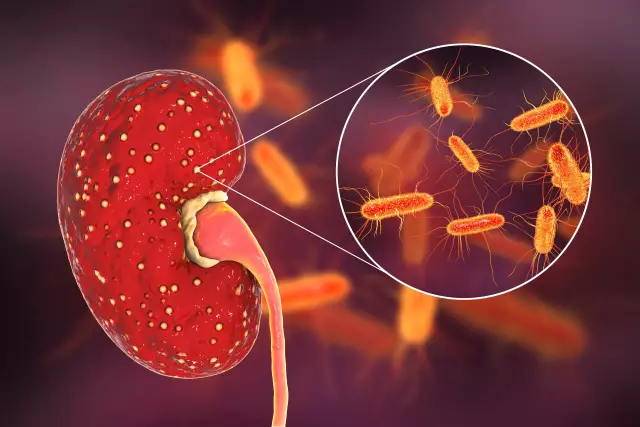- Author Rachel Wainwright wainwright@abchealthonline.com.
- Public 2023-12-15 07:39.
- Last modified 2025-11-02 20:14.
Tubulointerstitial nephritis

Tubulointerstitial nephritis is a kidney disease that predominantly affects the interstitial tissue and renal tubules. In addition, all other structures of kidney tissue are drawn into the inflammatory process in this disease. Tubulointerstitial nephritis can be acute or chronic.
Causes
The causes of this disease can be different, but most often the occurrence of acute tubulointerstitial nephritis is associated with the use of certain drugs (antibiotics, non-steroidal anti-inflammatory drugs, diuretics, etc.). Other reasons leading to the development of acute tubulointerstitial nephritis are some immune diseases, heavy metal poisoning, ethanol, ethylene glycol.
Chronic tubulointerstitial nephritis can be the outcome of the acute form of the disease. But most often it occurs without prior acute tubulointerstitial nephritis. The reasons for its occurrence are:
- Household, industrial or drug intoxication;
- Exposure to ionizing radiation;
- Metabolic disorders;
- Infections;
- Immune shifts.
Often, chronic tubulointerstitial nephritis occurs in people who abuse non-steroidal anti-inflammatory drugs.
Tubulointerstitial nephritis: symptoms
In acute tubulointerstitial nephritis, patients complain of fever, itchy skin rashes, pain in the lumbar region, increased weakness and fatigue. In the acute form of tubulointerstitial nephritis, symptoms of acute renal failure very quickly begin to join the symptoms described above: increased blood pressure, nocturia, polyuria or oligoanuria.
In the early stages of the chronic form of tubulointerstitial nephritis, symptoms are most often absent. They appear only when the inflammatory process leads to significant impairment of the concentration function of the kidneys and the development of chronic renal failure.
Tubulointerstitial nephritis in children

Tubulointerstitial nephritis in children is a fairly common pathology. Most researchers believe that this disease is of immunoallergic origin, because usually occurs in children and adolescents with a genetic predisposition to dysfunctions of the macrophage-phagocytic system and changes in immunological tolerance.
Very often tubulointerstitial nephritis in children occurs against the background of various dysmetabolic nephropathies (in 14% of cases). In addition, the onset of this disease in children is facilitated by the frequent and sometimes uncontrolled treatment of them with sulfa drugs and beta-lactam antibiotics (ampicillin, penicillin, cefazolin, etc.).
For the prevention of tubulointerstitial nephritis in children, it is very important not to self-medicate, to take any medications only as prescribed by a doctor and if there are clear indications for them. In addition, any infectious, allergic, immune diseases, as well as metabolic disorders should be promptly detected in children and treated.
Tubulointerstitial nephritis: treatment
The main goal of treating tubulointerstitial nephritis is to identify and eliminate the cause that led to the development of the disease. With tubulointerstitial nephritis, it is possible to use short courses of glucocorticoid therapy and / or cytostatics. Correction of violations of the water-electrolyte balance is mandatory. Diet therapy is also of great importance in the treatment of tubulointerstitial nephritis (table No. 7). With the development of the terminal stage of chronic renal failure, hemodialysis and kidney transplantation are indicated.
YouTube video related to the article:
The information is generalized and provided for informational purposes only. At the first sign of illness, see your doctor. Self-medication is hazardous to health!






